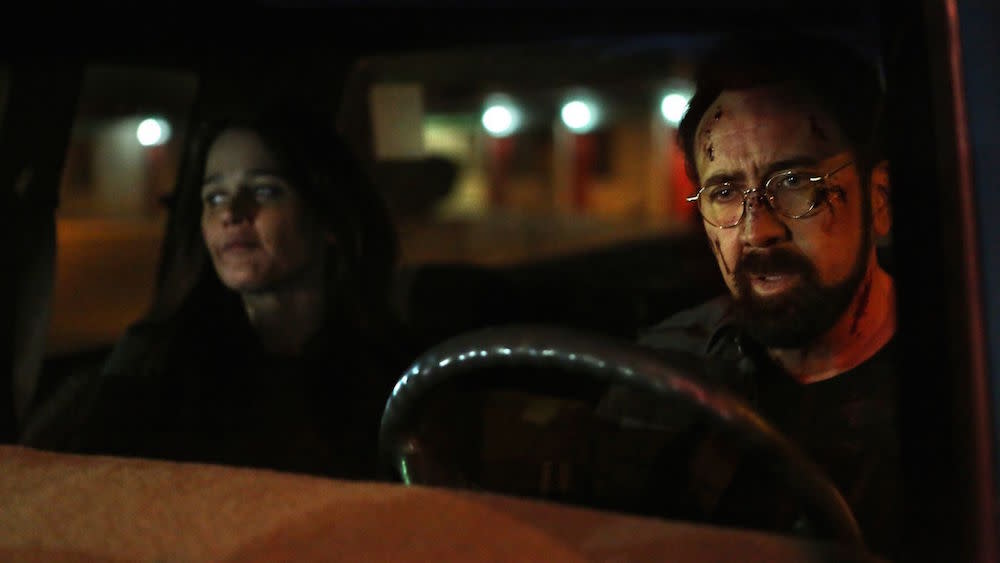Film Review: ‘Looking Glass’

Nicolas Cage continues to pad his resume with VOD-centric B-movies of wildly varying quality, demonstrating, if not discerning taste, then a prodigious work ethic that would have served him well as a Warner Bros. contract player during the 1930s and ’40s. “Looking Glass,” the latest in his seemingly endless parade of low-rent star vehicles, is notable mostly for showcasing a relatively restrained performance by the often manic actor. During almost the entirely of this derivative melodrama, a slow-burn scenario about strange doings at a second-rate desert motel, Cage tamps down his trademark tendency toward ravenous scenery chewing. He remains admirably disciplined even during scenes in which one of his co-stars is prematurely giving the game away by doing everything short of screaming, “I’m the mad killer! I’m the mad killer!”
Following the accidental death of their young daughter, married couple Ray (Cage) and Maggie (Robin Tunney) seek a new life in a new locale. They move from an unnamed “big city” and assume ownership of the Motor Way Motel, a humble roadside inn that could benefit from Ray’s applied use of his expertise as a handyman — which, given the genre, proves to be a predictably bad career move.
Upon their arrival, Ray and Maggie discover Ben (Bill Bolender), the previous owner, was in such a rush to vacate the premises, he left his keys to the place in a mailbox and took off for parts unknown. Of course, it’s possible that the guy wanted to vamoose before the new owners realized their clientele might consist primarily of only two regular guests — a good-ol’-boy trucker (Ernie Lively) who needs a place for adulterous trysts, and a dominatrix (Jacque Gray) who plies her trade by toying with compliant female clients. Eventually, however, Ray stumbles upon another possible motive for Ben’s hasty departure: Room 10 — which, not incidentally, is the favored room for both the trucker and the dominatrix — is tricked out with a two-way mirror that allows anyone hiding in a hidden passageway to view close encounters on the other side of the glass. Maybe Ben got caught peeking?
Ray can’t resist the allure of voyeurism, and he gets a hefty dose of guilty-pleasure cheap thrills while he watches the dominatrix dominate a sexy submissive woman. Unfortunately, that woman is found dead in the nearby desert shortly afterwards. Her demise, coming on the heels of another mysterious death at the motel, attracts the attention of Howard (Marc Blucas), the local sheriff, who’s quite ingratiating when he isn’t unsettling Ray with pointed questions. Like, does Ray have blood on his hands? And, by the way, where the hell is Ben?
Working from a screenplay (credited to Jerry Rapp and Matthew Wilder) that only sporadically is tethered by logic, helmer Tim Hunter (“River’s Edge”) pushes a tad too hard, too obviously, while striving to infuse “Looking Glass” with a David Lynchian air of portentous creepiness. (It should be noted that Hunter, a prolific TV director, has three episodes of the original “Twin Peaks” series to his credit.)
As it turns out, the movie offers a great deal more mood than matter. During slow stretches, of which there are many, one cannot help noticing conspicuously quirky details — the filthy feet of the dominatrix’s clients, the proliferation of owl images and allusions — that initially appear significant, but wind up meaning nothing. Likewise, disruptions are introduced (an act of vandalism here, a dead pig tossed into a swimming pool there) but never satisfyingly explained.
There also are half-hearted hat-tips to Alfred Hitchcock in a couple of heavy-handed sequences — one that juxtaposes simultaneous actions, another that follows a quarrel to a lustful payoff — that attempt to link sex and violence, two activities that have long been employed to exploit the voyeuristic impulses of movie audiences. But that doesn’t help. Ultimately, “Looking Glass” simply runs out of steam, and dutifully unveils its climactic reveal. After that, there is zero effort made to tie up dangling plot threads. It’s almost as though everyone involved collectively said, “Aw, hell, let’s just get this over with.” And so they do.
Related stories
Nicolas Cage on High Movie Prices, Not Playing Superman and Sundance Action Movie 'Mandy'
Nicolas Cage's 'Humanity Bureau' Set for Theatrical, Virtual Reality Releases (EXCLUSIVE)
Subscribe to Variety Newsletters and Email Alerts!

